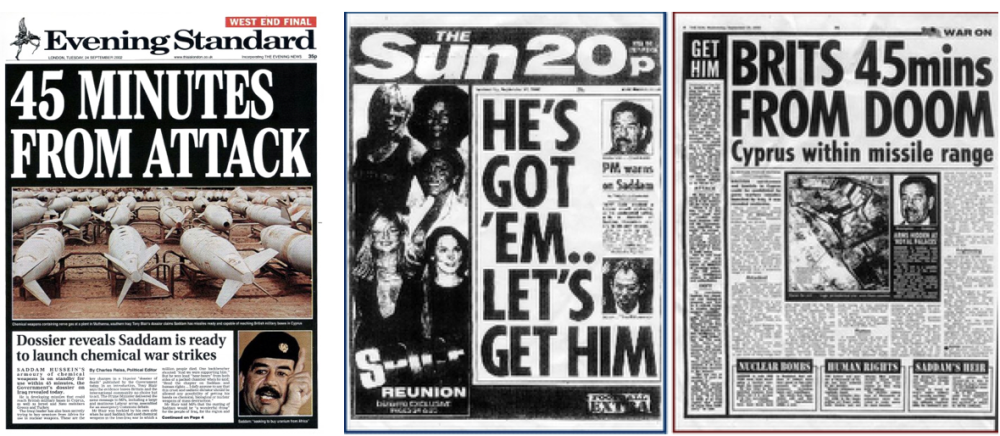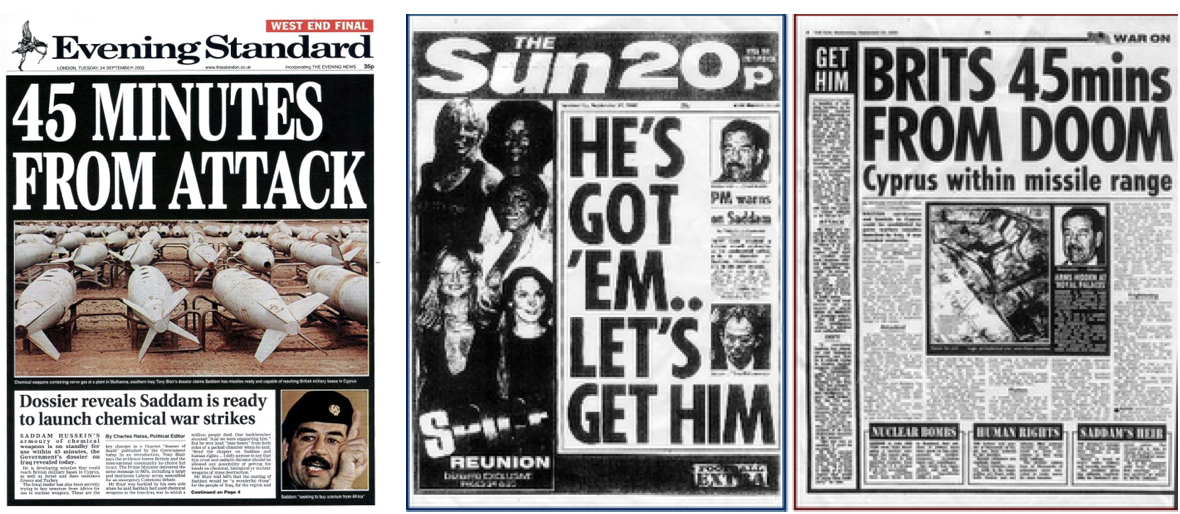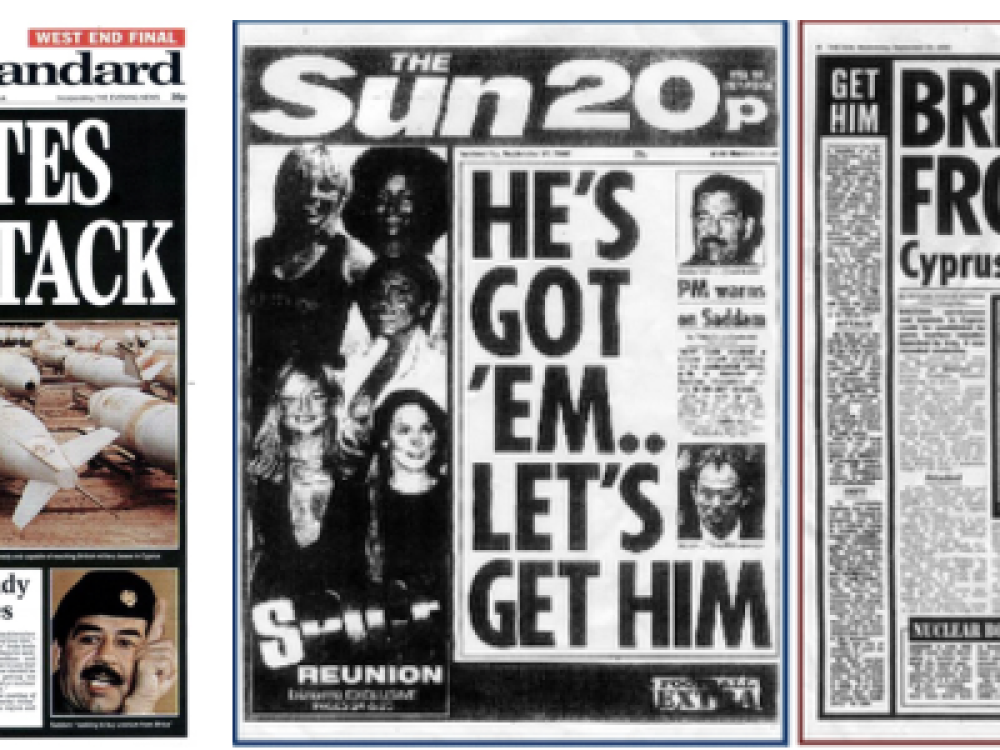It’s unlikely any justice will come from the Chilcot Inquiry. Chilcot’s remit stopped short of assessing the legality of the Iraq War but his conclusions - that the UK went to war with "no imminent threat" from Iraq and “did not exhaust all peaceful options” - effectively condemns the war as an act of aggression. Legally, there really isn’t scope for much more than this. Jus ad bellum (the right to war) will not fall under the International Criminal Court’s jurisdiction until 2017.
For Tony Blair, Chilcot’s report clearly makes no difference. For all his apparent contrition at Wednesday’s press conference, he seemed to have read a different report; one in which he is the deceived and wronged hero. In this parallel world, Blair can “accept” Chilcot’s criticisms, while “disagreeing” with them, and then continue to repeat or imply many of the claims for which he is criticized in the first place.
Blaming Blair is easy; preventing another unjust war is not. If the Chilcot Inquiry is to have any lasting value the deceptions surrounding the Iraq War must not be treated as a one-off aberration from the norm. There were many calls on Wednesday to remember the courageous UK MPs who opposed war in Iraq – notably Robin Cook and Charles Kennedy, both now deceased. But such remembrance is pointless if those who now oppose unjust wars are ignored or ridiculed.
Jeremy Corbyn's call "to give parliament the decisive say over any future decision to go to war based on objective information not through government discretion but through a War Powers Act" was far more relevant than the apology he issued on behalf of the Labour Party. Yet, for the media the apology was the better story.
Weapons of Mass Deception
There is no Chilcot Inquiry for the UK news media. If there were, the journalists and editors who kept those war drums beating would likely be as falsely contrite as Tony Blair in his press conference. You can see some of their reluctant hand wringing in John Pilger's The War You Don't See. It's a familiar pattern.
Every recent, highly mediated war has generated the same impenetrable vicious cycle of enthusiasm and fascination, frustration, remorse and excuses, followed by the formulation of new good intentions for the next war or conflict (Carpentier & Tenzier 2005).
Most of the UK news media either supported or failed to adequately question Blair’s war on Iraq. The Mirror under Piers Morgan was an admirable exception. Elsewhere, The Sun compared the anti-war Liberal Democrats leader Charles Kennedy to a “spineless reptile that spits venom”. The Times lambasted another critic of the war, French President Jacques Chirac, as one of "history's losers". Such pro-war propaganda was not limited to the Murdoch press.
In Pockets of Resistance, a study of UK pre-war media coverage, the authors conclude that anti-war actors "had a difficult time in gaining access to the British news media and winning sympathetic coverage". Meanwhile, fabricated claims about Saddam Hussein's weapons of mass destruction (WMD) - issued to journalists by Alastair Campbell in the infamous 'dodgy dossier' - were relayed to the British public and often unchallenged. A study by Lewis et al. (2006) found that UK broadcasters were eight times more likely to suggest the existence of WMD than to imply doubt about their presence in Iraq. This is despite the public reservations of UN weapons inspectors and the incredulous response of the international community to Colin Powell's presentation to the UN in February 2003.
Although there were some critical voices, the prominence of distorted facts and the absence of context presented a clear bias towards pro-war assumptions. Once the war began, civilian casualties were hidden behind righteous support for the troops. Front page headlines in The Times celebrated Blair's war: 'We are liberating a country that is enslaved by a lunatic’, 'Birthplace of Saddam might yet be his grave”, and 'The blitzing of Baghdad'.
The BBC was equally enthusiastic in reporting a just and honourable 'liberation' of Iraq. Andrew Marr's effusive endorsement of Tony Blair on April 9th 2003 leaves no doubt about the cosy relations between the media and government during war time.
Frankly, the main mood is of unbridled relief. I’ve been watching ministers wander around with smiles like split watermelons. ... I think this does one thing – it draws a line under what, before the war, had been a period of… well, a faint air of pointlessness, almost, was hanging over Downing Street. There were all these slightly tawdry arguments and scandals. That is now history. Mr Blair is well aware that all his critics out there in the party and beyond aren’t going to thank him – because they’re only human – for being right when they’ve been wrong. And he knows that there might be trouble ahead, as I said. But I think this is very, very important for him. It gives him a new freedom and a new self-confidence. He confronted many critics. I don’t think anybody after this is going to be able to say of Tony Blair that he’s somebody who is driven by the drift of public opinion, or focus groups, or opinion polls. He took all of those on. He said that they would be able to take Baghdad without a bloodbath, and that in the end the Iraqis would be celebrating. And on both of those points he has been proved conclusively right. And it would be entirely ungracious, even for his critics, not to acknowledge that tonight he stands as a larger man and a stronger prime minister as a result. (Andrew Marr, BBC News at Ten, BBC1, April 9, 2003)
When Tony Blair was interviewed on the BBC about his 2010 autobiography the natural choice of interviewer was, of course, Andrew Marr.
During the war, Marr might have been excessive but he was not alone in dropping any pretence to journalistic standards. Across UK media, reports of Iraqis welcoming the occupation forces doubled the number of reports depicting Iraqis critical of the occupation (Lewis et al. 2006). The process of embedding seemingly independent journalists with the military augmented the focus on troops over and above the broader strategies and consequences of the war. For Martin Bell, a former BBC war correspondent, this insularity signaled “the death of news”.
The news media bear responsibility for the war you didn't see as heroic images of coalition soldiers took precedence over civilian casualties. Images relayed from Iraq were often deeply ideological in reinforcing the idea that the war was a humanitarian exercise: we saw soldiers in action to 'save' Iraqis from Saddam, they received flowers from Iraqi children and handed out food. The images appeared to confirm what US Vice President Dick Cheney predicted - "we will be greeted as liberators" - but they were utterly decontextualised. As Chilcot asserts, the extreme violence that followed the invasion was not beyond anticipation.
As the war continued, the misreporting of events and the general neglect of Iraqi casualties as a news story is reflected in the fact that polls in both the US and Britain found that public estimates of the Iraqi death toll was staggeringly low (ComRes 2013; Kull et al. 2006). Most damning is the misreporting of Fallujah; that 'war crime within a war crime within a war crime' which saw US and British forces keep the males of 'fighting age' inside the city before bombing it with depleted uranium and white phosphorus. Numerous medical studies have linked this bombardment to a rise in horrific congenital birth defects. If they reported these findings at all, the UK media saw no reason to link the story back to their own uncritical coverage of the siege and bombardment. Coverage of war is episodic and, unlike politicians, the news media are rarely held to account for their inconsistencies.
There is little evidence that any lessons have been learned from Iraq. To commemorate the ten year anniversary of the war, the BBC broadcast a three-part series The Iraq War (2013). As if the intervening years hadn't revealed anything of note, the series drew heavily on the testimony of Tony Blair and Dick Cheney to address the apparently troublesome question of why Saddam Hussein failed to confirm that Iraq did not possess WMD.
To explain Brexit and Donald Trump, the phrase "post truth" has become fashionable but the conditions of our politics and media are not so radically new. Regarding war media, post-truth is better described using the old fashioned term 'propaganda'. After all, propaganda never implied that journalists actually believed what they published or broadcast.
The news media are a business that will take attention (and profit) wherever they can. This was obvious enough in the aftermath of Chilcot's report when attention focused on the game of finger pointing and the generation of controversy through false balance. The meaning of war in human terms or actual definitions of war in legal terms were not given any great significance. In Ireland, the absurd Chilcot discussion on RTE's Liveline and Pat Kenny's soft interview with Alastair Campbell on Newstalk are exemplary of news media incapable or unwilling to deal with war in truthful and factual terms. Yes, Saddam Hussein was a despicable dictator but beyond this most basic fact, the presenters knew little about Iraq or the war.
The entire history of warfare is one of 'post-truth'; the new names we give to this condition do not matter. War long predates ideas of media and journalism. The rhetoric of war we find today - the warmongering and post-war regret - can be traced back to texts from Ancient Greece. Truth is as rare and valuable now as it was in Ancient Greece. If we expect our much more modern concept of journalism to be a vehicle of truth, we need to move beyond the ancient rhetoric and we must not let the dust of Chilcot settle without real commitment to accepting the moral and legal implications of war in far away places. Our war media is life and death for other people.
The oldest cliché is that truth is the first casualty of war. I disagree. Journalism is the first casualty. Not only that: it has become a weapon of war, a virulent censorship that goes unrecognized in the United States, Britain, and other democracies; censorship by omission, whose power is such that, in war, it can mean the difference between life and death for people in faraway countries, such as Iraq (John Pilger, 2006).
Cover Image: Wikipedia
Subscribe to FuJo's Newsletter




